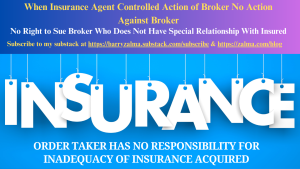When Insurance Agent Controlled Action of Broker No Action Against Broker

Post 4899
See the full video at https://rumble.com/v5gatm5-when-insurance-agent-controlled-action-of-broker-no-action-against-broker.html and at https://youtu.be/DfMnGZdF-Ek
Plaintiff Green Technology Lighting Corporation (“Green Tech”) appealed the order of the District Court for the District of Idaho granting summary judgment in favor of Defendant Crouse and Associates Insurance Services of Northern California (“Crouse”).
In Green Technology Lighting Corp. v. Crouse And Associates Insurance Services Of Northern California, Inc., a California Corporation, No. 24-66, United States Court of Appeals, Ninth Circuit (September 20, 2024) resolved the dispute over the existence of a special relationship between an insured and its broker.
FACTUAL BACKGROUND
The district court granted summary judgment to Crouse on Green Tech’s claim of negligence and broker malpractice for two independent reasons: First, the court held that Crouse did not owe Green Tech a duty of care, an essential element of negligence claims under Idaho law; and Second, the court determined that Idaho’s economic loss rule bars recovery for any negligence committed by Crouse.
Idaho prohibits the recovery of purely economic losses in all negligence actions.. A purely economic loss is one that is not connected to an injury to a person or property because the economic loss rule limits the actor’s duty so that there is no cause of action in negligence. Summary judgment is only appropriate in cases where the rule applies. Green Tech alleged only economic losses connected to the recall of its products. Unless some exception applies, Green Tech has no cause of action for negligence under Idaho law.
Idaho generally recognize two exceptions to the economic loss rule:
where a special relationship exists between the parties, or
where unique circumstances require a reallocation of the risk.
The district court concluded that neither applied in Green Tech’s case.
ANALISYS
The special relationship exception is extremely narrow and applies in only limited circumstances. Idaho recognizes two situations in which a special relationship has been held to exist:
where a professional or quasi-professional performs personal services; or
where an entity holds itself out to the public as having expertise regarding a specialized function, and by so doing, knowingly induces reliance on its performance of that function.
The Ninth Circuit concluded that neither situation fits the facts of this case. The district court correctly held that, although Crouse was a professional insurance broker, it lacked the “custody or control” over Green Tech’s insurance coverage that would justify recognizing a special relationship giving rise to liability. Crouse did not have ultimate authority over which insurance policies Green Tech obtained rather, it was Insure Idaho-Green Tech’s insurance agent-that instructed Crouse to bind the policy with less coverage. Crouse did not unilaterally control the level of liability coverage that Green Tech would receive.
The Ninth Circuit concluded there was thus no special relationship between Crouse and Green Tech based on the professional services Crouse offered. Nor did a special relationship exist due to Green Tech’s reliance on Crouse’s expertise. This exception requires that an expert have actively sought to induce reliance on the part of the plaintiff.
Where there is no indication in the record that the plaintiffs relied upon or were even aware of the defendant’s provision of its special services, there is no special relationship.
The district court found that Green Tech had no knowledge of Crouse’s existence as it interfaced only with Insure Idaho in seeking to procure insurance for its business. Green Tech failed to raise a genuine factual dispute as to this finding. The economic loss rule thus prohibited Green Tech from recovering for any alleged negligence on Crouse’s part.
Assuming that Crouse owed some duty of care to Green Tech in how it performed its brokering services, the Ninth Circuit agreed with the district court that the economic loss rule is fatal to Green Tech’s negligence suit.
The economic loss rule prevented a suit against a broker who had no relationship with the insured and only contact with the insured’s agent. Since the broker acted, basically, as an order taker for the insurance agent and provided no advice or counsel to the insured nor hold itself out as a specialist giving advice to the insured, there was insufficient contact with the plaintiff-insured to allow it to maintain a suit because of the economic loss rule since the plaintiff only lost money.

Please tell your friends and colleagues about this blog and the videos and let them subscribe to the blog and the videos.
Subscribe to my substack at https://barryzalma.substack.com/subscribe
Go to X @bzalma; Go to Newsbreak.com https://www.newsbreak.com/@c/1653419?s=01; Go to Barry Zalma videos at Rumble.com at https://rumble.com/account/content?type=all; Go to Barry Zalma on YouTube- https://www.youtube.com/channel/UCysiZklEtxZsSF9DfC0Expg
Go to the Insurance Claims Library – https://lnkd.in/gwEYk
Like this:
Loading…
Related
About Barry Zalma
An insurance coverage and claims handling author, consultant and expert witness with more than 48 years of practical and court room experience.







